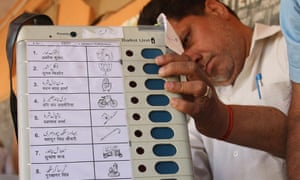
An Indian officer examines an electronic voting machine ahead of parliamentary elections in Jammu. Photograph: Jaipal Singh/EPA
By Yead Mirza 29 October 2018
Faced with a wave of criticism from political corners and civil society members for the alleged erroneous and malicious use of the Electronic Voting Machines, India’s Election Commission had introduced the Voter Verifiable Paper Audit Trail.
A recent Via News Agency report pointed out a major feature of the Voter Verifiable Paper Audit Trail (VVPAT). The report suggests that unlike how Electronic Voting Machines (EVMs) are used in other countries, this VVPAT mechanism produces of a paper slip which bears the name and symbol of the candidate for whom the elector has voted. The officially stated intention of the Election Commission behind introducing the VVPAT mechanism was to boost the transparency of the electronic voting process.
In 2004, EVMs were used nation-wide in India. Later, the technology was used in all assembly polls and the general elections in 2009. It is worth noting that the last Indian parliamentary election in 2014 saw the use of around 1.4 million EVMs in 930,000 polling stations.
Despite this all-out use, the use of EVMs in elections is now faced with the question of credibility in the world’s largest democracy. In March 2018, the Congress, India’s one of the two largest parties (other being the ruling Bharatiya Janata Party), demanded stopping the use of EVMs and recommended using the paper ballots instead.
In May 2018, Samajwadi Party president Akhilesh Yadav and Rashtriya Lok Dal spokesperson Anil Dubey alleged that there were reports of problems in EVMs in Noorpur and Kairana bypolls.
Furthermore, Hindustan Times reported that the Bahujan Samaj Party chief Mayawati Das, the former Chief Minister of Indian state of Uttar Pradesh, and the national convener of the Aam Aadmi Party Arvind Kejriwal, the current Chief Minister of Delhi, alleged that the EVMs were tampered during the 2017 Uttar Pradesh Assembly elections and Punjab polls respectively,
In the aforesaid Via News Agency report, the current-day challenges faced due to the use of EVMs during elections were brought forward exhaustively, including the challenges faced by India. The report mentions, “In India, a group of international and national experts presented during a conference a paper titled “Security Analysis of India’s Electronic Voting Machines”, where they have demonstrated two attacks using custom hardware, which corrupt election insiders or other criminals with even brief physical access to the EVMs could carry out.
Furthermore, giving a list of national and state level political parties and leaders who oppose the EVMs as well as the VVPAT, the report suggests that even the top leaders from the ruling Bharatiya Janata Party (BJP) too questioned the reliability of the EVMs when the party was in the opposition.
According to an India Today news report, the Election Commission has repeatedly denied the charge and rebuffed the claims that the EVM is not connected to any server, so cyber hacking of Indian EVMs is not possible ‘unless an authorized person acts with malafide intention’.
But, what if there’s authorized persons with malafide intention. Going by the findings of the aforesaid report, it appears that such persons can carry out attack on the EVMs with just a brief physical access.
